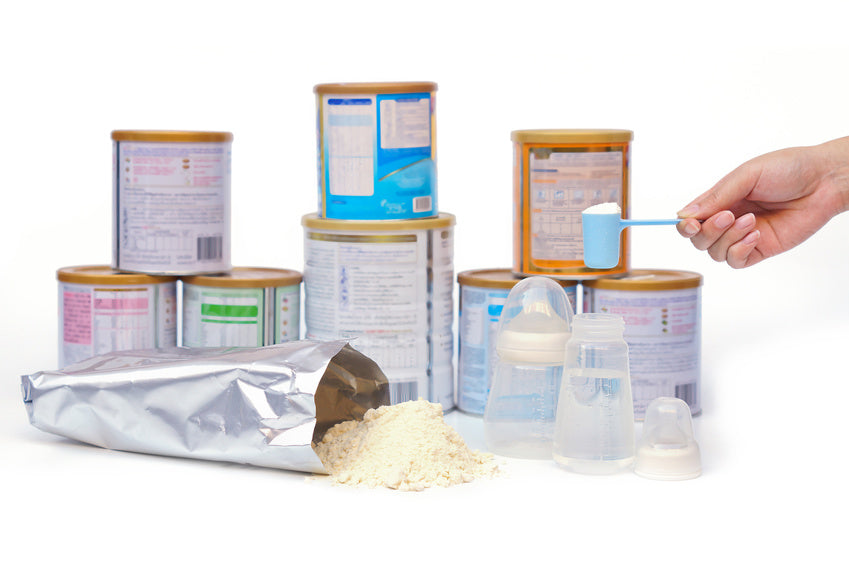
For the most part, all organic baby formulas have a similar ingredients list, usually consisting of milk, a carbohydrate, and added nutrients. However, there are a few key differences between formulas that you should be aware of. These differences concern the amount of undesirable or possibly problematic ingredients. If you are unfamiliar with the ingredients in many formulas, please check out our posts on “Understanding Formula Ingredients,” and “Understanding Sugars in Formula.” Note that for the purposes of distinguishing between formulas made in the United States and Europe, European formulas are marked with an asterisk.
Similac Organic Formila
Similac is one of the biggest leaders in conventional baby formulas in the United States. Similac is produced by the pharmaceutical company Abbott Laboratories. Similac Organic formula contains the following problematic ingredients:
-Organic maltodextrin
– Organic sugar (not specified)
-Organic soy oil
-DHA and ARA processed from algal and fungal sources using hexane
-Fructooligosaccharides (an added sugar)
-Several synthetic nutrients
Parent’s Choice Organic Formula
Walmart’s Parent’s Choice Organic Formula is comparable to Similac and has quite a few problematic ingredients. It is produced by Perrigo under PBM Nutritionals. Parent’s Choice contains the following problematic ingredients:
-Organic maltodextrin
-Organic palm or palm olein oil
-Organic corn syrup solids
-DHA and ARA processed from algal and fungal sources using hexane
-Fructooligosaccharides (an added sugar)
– Organic soy lecithin
-Several synthetic nutrients
Vermont Organics
Vermont Organics is produced by Perrigo under PBM Nutritional. It contains the following problematic ingredients:
-Organic palm or palm olein oil
-Organic soy oil
-Organic glucose syrup solids
-Organic Maltodextrin
– DHA and ARA processed from algal and fungal sources using hexane
-Organic soy lecithin
Have a look at our Vermont Organics Collection
Honest Company
The Honest Company sustainably harvests their palm oils. They also use a fish oil source for DHA that contains vitamin D3 and E. Honest Company formulas contain the following problematic environments:
-Glucose syrup solids
-Palm or palm olein oil
-Soy oil
-Soy lecithin
Have a look at our Honest Company Collection
Earth’s Best:
Earth’s Best Organic Formula is also produced by Perrigo under PBM Nutritionals. Unlike many formulas Earth’s best uses lactose as a sweetener, which is the best choice if sugar is to be added to a formula. Earth’s Best contains the following problematic ingredients:
-Organic palm or palm olein oil
-Organic soy oil
-Soy lecithin
– DHA and ARA processed from algal and fungal sources using hexane
Have a look at our Earth´s Best Collection
Baby’s Only
Baby’s Only organic formula is produced by Nature’s One, a family owned and operated company. It is marketed as “toddler formula” because of the company’s dedication to breastfeeding. However, it meets all of the FDA standards for infant formula. They use DHA and ARA in their formula, but are the only company that produces it from eggs, without using hexane. Baby’s Only contains the following problematic ingredients.
– Organic brown rice syrup, which is the first ingredient.
-Organic soy oil
-Organic soy lecithin
*Holle
Holle is one of the oldest baby food companies in Europe. They have great biodynamic farming practices. Holle contains only two problematic ingredients, and they are some of the least offending.
-Palm oil
-Maltodextrin
Have a look at our Holle Collection
*BabyLove
Baby love is a German company, also committed to high standards. Like Holle they have very few problematic ingredients and are the least offending.
-Palm oil
-Maltodextrin
Have a look at our BabyLove Collection
*Lebenswert Organic Formila
Lebenswert is a company that operates under Holle. They are a good organic company that produces a good organic formula. The only possibly problematic ingredient in their formula is palm oil.
Have a look at our Lebenswert Collection
*Hipp
Hipp organic formula is another good German brand. They are very committed to the health of your baby and do not add in unnecessary sugars or ingredients. Hipp Organic formula contains LCP an oil made from fish and veggies to provide Omega 3 and 6 fatty acids. The only possibly problematic ingredient in Hipp formula is palm oil.
When looking at all formula it helps to understand that breastmilk simply cannot be replicated or compared to formula. Breastmilk is the only 100% natural choice that contains none of the problematic ingredients found in formula. However, if you cannot breastfeed for any reason, using this comparison will help you determine which organic formula will best fit your baby’s needs. Just choosing an organic formula will give you a big step up from all of the harmful things found in non-organic formulas. And often, choosing a formula manufactured in Europe, where standards are higher than those in the US will help you find the formula with very few problematic ingredients.
Have a look at our HiPP Collection
A Note on Palm Oil:
Palm oil is found in nearly all organic formulas. Similac and Baby’s Only are the two exceptions. The main concern with palm oil is its potential to cause upset stomach and hinder some nutrient absorption. Some studies indicate that palm oil may interfere with calcium absorption.
A Note on Maltodextrin:
It has recently come to my attention that the article on sugars in infant formula is missing maltodextrin. Maltodextrin is not a direct sugar, but rather a starch that is hydrolyzed (using enzymes or acids) from corn, rice or potatoes. Maltodextrin is a less problematic carbohydrate than say high fructose corn syrup, or glucose syrup; however it can still cause a spike in blood sugar. It can also be a source of gas if a baby is sensitive to starches.